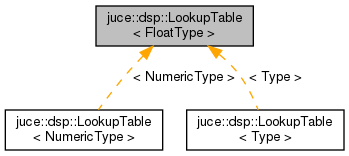Class for efficiently approximating expensive arithmetic operations. More...
#include <juce_LookupTable.h>


Public Member Functions | |
| LookupTable () | |
| Creates an uninitialised LookupTable object. More... | |
| LookupTable (const std::function< FloatType(size_t)> &functionToApproximate, size_t numPointsToUse) | |
| Creates and initialises a LookupTable object. More... | |
| FloatType | get (FloatType index) const noexcept |
| Calculates the approximated value for the given index with range checking. More... | |
| size_t | getNumPoints () const noexcept |
| Returns the size of the LookupTable, i.e., the number of pre-calculated data points. More... | |
| FloatType | getUnchecked (FloatType index) const noexcept |
| Calculates the approximated value for the given index without range checking. More... | |
| void | initialise (const std::function< FloatType(size_t)> &functionToApproximate, size_t numPointsToUse) |
| Initialises or changes the parameters of a LookupTable object. More... | |
| bool | isInitialised () const noexcept |
| Returns true if the LookupTable is initialised and ready to be used. More... | |
| FloatType | operator[] (FloatType index) const noexcept |
Private Member Functions | |
| size_t | getGuardIndex () const noexcept |
| void | prepare () noexcept |
Static Private Member Functions | |
| static size_t | getRequiredBufferSize (size_t numPointsToUse) noexcept |
Private Attributes | |
| Array< FloatType > | data |
Class for efficiently approximating expensive arithmetic operations.
The approximation is based on linear interpolation between pre-calculated values. The approximated function should be passed as a callable object to the constructor along with the number of data points to be pre-calculated. The accuracy of the approximation can be increased by using more points at the cost of a larger memory footprint.
Consider using LookupTableTransform as an easy-to-use alternative.
Example:
LookupTable<float> lut ([] (size_t i) { return std::sqrt ((float) i); }, 64);
auto outValue = lut[17];
{DSP}
| juce::dsp::LookupTable< FloatType >::LookupTable | ( | ) |
Creates an uninitialised LookupTable object.
You need to call initialise() before using the object. Prefer using the non-default constructor instead.
| juce::dsp::LookupTable< FloatType >::LookupTable | ( | const std::function< FloatType(size_t)> & | functionToApproximate, |
| size_t | numPointsToUse | ||
| ) |
Creates and initialises a LookupTable object.
| functionToApproximate | The function to be approximated. This should be a mapping from the integer range [0, numPointsToUse - 1]. |
| numPointsToUse | The number of pre-calculated values stored. |
|
inlinenoexcept |
Calculates the approximated value for the given index with range checking.
This can be called with any input indices. If the provided index is out-of-range either the bottom or the top element of the LookupTable is returned.
If the index is guaranteed to be in range use the faster getUnchecked() instead.
| index | The approximation is calculated for this non-integer index. |
|
inlineprivatenoexcept |
Referenced by juce::dsp::LookupTable< Type >::get().
|
inlinenoexcept |
Returns the size of the LookupTable, i.e., the number of pre-calculated data points.
Referenced by juce::dsp::LookupTable< Type >::get(), juce::dsp::LookupTable< Type >::getGuardIndex(), and juce::dsp::LookupTable< Type >::getUnchecked().
|
inlinestaticprivatenoexcept |
Referenced by juce::dsp::LookupTable< Type >::getGuardIndex().
|
inlinenoexcept |
Calculates the approximated value for the given index without range checking.
Use this if you can guarantee that the index is non-negative and less than numPoints. Otherwise use get().
| index | The approximation is calculated for this non-integer index. |
Referenced by juce::dsp::LookupTable< Type >::get(), and juce::dsp::LookupTable< Type >::operator[]().
| void juce::dsp::LookupTable< FloatType >::initialise | ( | const std::function< FloatType(size_t)> & | functionToApproximate, |
| size_t | numPointsToUse | ||
| ) |
Initialises or changes the parameters of a LookupTable object.
This function can be used to change what function is approximated by an already constructed LookupTable along with the number of data points used. If the function to be approximated won't ever change, prefer using the non-default constructor.
| functionToApproximate | The function to be approximated. This should be a mapping from the integer range [0, numPointsToUse - 1]. |
| numPointsToUse | The number of pre-calculated values stored. |
Referenced by juce::dsp::LookupTableTransform< Type >::LookupTableTransform().
|
inlinenoexcept |
Returns true if the LookupTable is initialised and ready to be used.
Referenced by juce::dsp::LookupTable< Type >::getUnchecked().
|
inlinenoexcept |
|
privatenoexcept |
|
private |